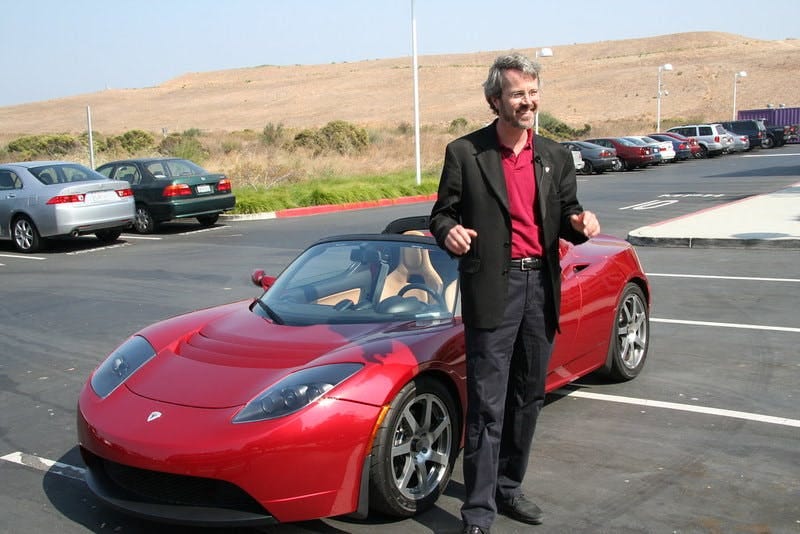
Editor's Letter: When it comes to startup ideas, genius steals
In 2003, Tesla Motors had nothing to do with Elon Musk.
Sitting in Disneyland's "Blue Bayou" restaurant with his wife, Martin Eberhard suggested a name for the company he'd been working on with his co-founder, Marc Tarpenning. After selling e-reader business Rocket Book in 2000 for $187MM, the two engineers looked to bring the power of the lithium-ion battery, leveraged in the Rocket device, to a new vertical. They'd settled on cars.
Eberhard had suggested dozens of names over the past few months without any luck. No matter how hard he tried, each moniker ended up sounding overly eco-minded, wonky. General Motors, automobile royalty, had just frittered $1B on the EV-1 having failed to attract buyers beyond the bohemians and tech geeks. That too weighed on Eberhard's mind.
"What about Tesla Motors?" he asked, finally, the whir and screams of the Pirates of the Caribbean ride competing with his question.
"Perfect!" his wife yelled over the din. "Now get to work making your car."
Within a few days Teslamotors.com was registered and both Eberhard and Tarpenning were off to the races. It would be almost another year until the two would reconnect with the man they'd seen speak at the Mars Society conference a few years earlier. What began as an investing relationship with Musk would turn into much more. In many ways, Musk was the classic overreaching investor, leading the company's Series A before jumping into the weeds to weigh in on product design and push for a carbon-fiber-reinforced-polymer body for the vehicle. It would take another four years before Musk assumed the CEO role, taking over in 2008 only after three others — Eberhard included — had been in the driver's seat. By that time, Tesla's "founders" had already left. A year later, Eberhard would sue Musk over assuming the "co-founder" honorific, with the trio eventually agreeing that each of them, plus two others, could use the title.
There are many lessons you might take from the story above: the importance of tracking efficiency curves (Eberhard was keenly aware of lithium-ion's steady improvement), the megalomania of great operators, the necessity of a good name, the importance of execution. What I choose to take from it is this: the greatest innovator of our era did not come up with the idea for which he is best known. To achieve all that he has, even Elon needed to rely on inspiration from elsewhere.
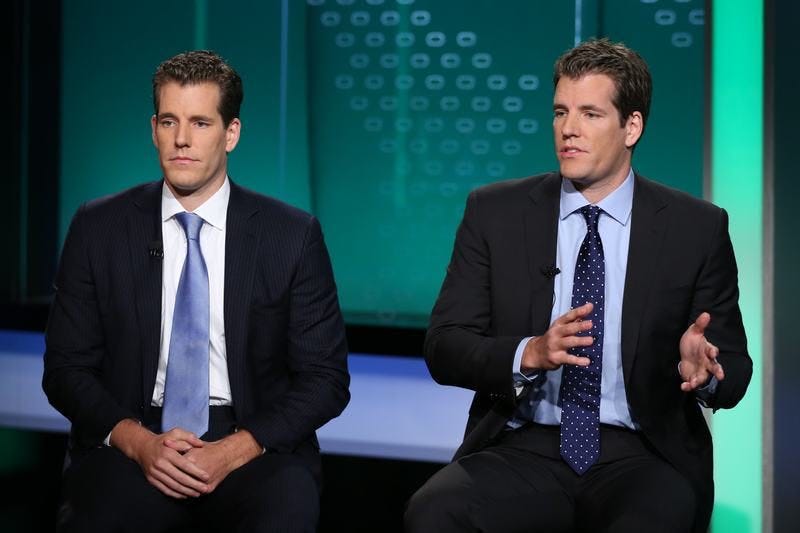
That is a story reprised across the startup world's successes. In order to build The Facebook, Zuckerberg pilfered from the Winklevii. To super-pump Uber, Kalanick required the initial insight of Garrett Camp. Or as Kalanick put it, "Garrett is the guy who invented that shit." With similar eloquence Oscar Wilde is believed to have quipped, "Talent borrows, genius steals." When it comes to deciding what to work on, tech's giants seem to ask: why not both?
But for those of us that don't have the benefit of friends like Camp or Eberhard, do not have a single Winklevoss to bait-and-switch, where should we find inspiration? It may very well be TIME TO BUILD, but it isn't fair to ask what? Forging "Elon Musk's 'alien dreadnoughts,'" as suggested in Marc Andreessen's piece, may not sound like a life's work for everyone. (And for all we know, Elon could have gotten the idea from someone else.)

This is precisely the problem The Generalist is hoping to amend with a new initiative, developed with Aashay Sanghvi of Haystack. (He's a great writer, by the way.) Of course, we had to steal the name for it. Y Combinator coined the term "Request for Startups" or "RFS" to refer to sectors in which they'd like to back founders. RFS 100 builds on that premise. Over the past couple of months, Aashay and I have reached out to our favorite investors, founders, and operators to ask what startup they wish existed and why they think it's a promising idea. We've curated the best 100 to share, 10 at a time over the next 10 weeks.
If you're subscribed to The Generalist, you'll receive the first edition next week, but if you'd like to make sure to see all 100 ideas, click the button below and you'll be added to the list, no sign-up required. If you have friends who you think might dig the project, send them here.
Over the course of the series, you'll hear which founder thinks there should be an "Affirm for healthcare payments," which product designer sees potential in a "Barkbox for Mom & Pop shops," and which investor would like to see an "API for last-mile delivery." In the process, we hope you'll learn about new spaces, see what others in the market find interesting, and maybe even stumble upon an idea for your next company. Unlike Eberhard, we promise not to take you to court over a "cofounder" title.
In other news...
A new edition of The Miss was released this week, featuring Issam Freiha, founder and partner of Reshape. Since inception, Reshape has invested in Sweetgreen, UiPath, Sonder, Lime, Neighborhood Goods, Headspin, and many other leading companies. Issam spoke about his first win backing EquipmentShare, the mistakes he made in passing on Overtime and Touch Surgery, and how he thinks about investing in four-wall businesses during the current crisis. I learned a lot from talking with him.
Brief
George Bernard Shaw's thoughts on Apple(s)
The Prime Minister channeling Tim Ferris
The telemedicine startups fighting "deaths of despair"
A hack for finding meaning in lockdown
Dan Bilzerian's crumbling empire
The link between Satoshi Nakamoto and a 15th-century manuscript
Jobs at TransLink Capital, Redesign Health, and the Gates Foundation
Record-breaking riddlers
Overheard
"If you have an apple and I have an apple and we exchange these apples then you and I will still each have one apple. But if you have an idea and I have an idea and we exchange these ideas, then each of us will have two ideas." — George Bernard Shaw
Good news
Small mercies
Though coronavirus has put 36MM Americans out of work, at least in the short-term, it may create new jobs in its wake. Companies have begun hiring for social-distance monitors, plexiglass installers, contact tracers, decontamination technicians, and thermal scanners.
The 4-Day Workweek
Sounding very much like a Tim Ferris knock-off, New Zealand Prime Minister Jacinda Arden has a proposition for reinvigorating the island's economy. Hailed for her assured, empathetic response to Covid, Arden has encouraged companies to shorten the workweek in the hopes that it might encourage domestic tourism and improve work/life balance.
Opt-out
Deployed mostly to dupe consumers into subscribing for "exclusive content and deals" across the web's various vendors, opt-out can be a powerful default when used for good. England made changes to its organ donation laws this week, ensuring that donor consent will be presumed for all adults unless family intervenes, or an individual has opted out. Given that less than 40% of the population has signed up to be donor, though 80% would consider it, the move stands to save hundreds of lives a year.
1000 words
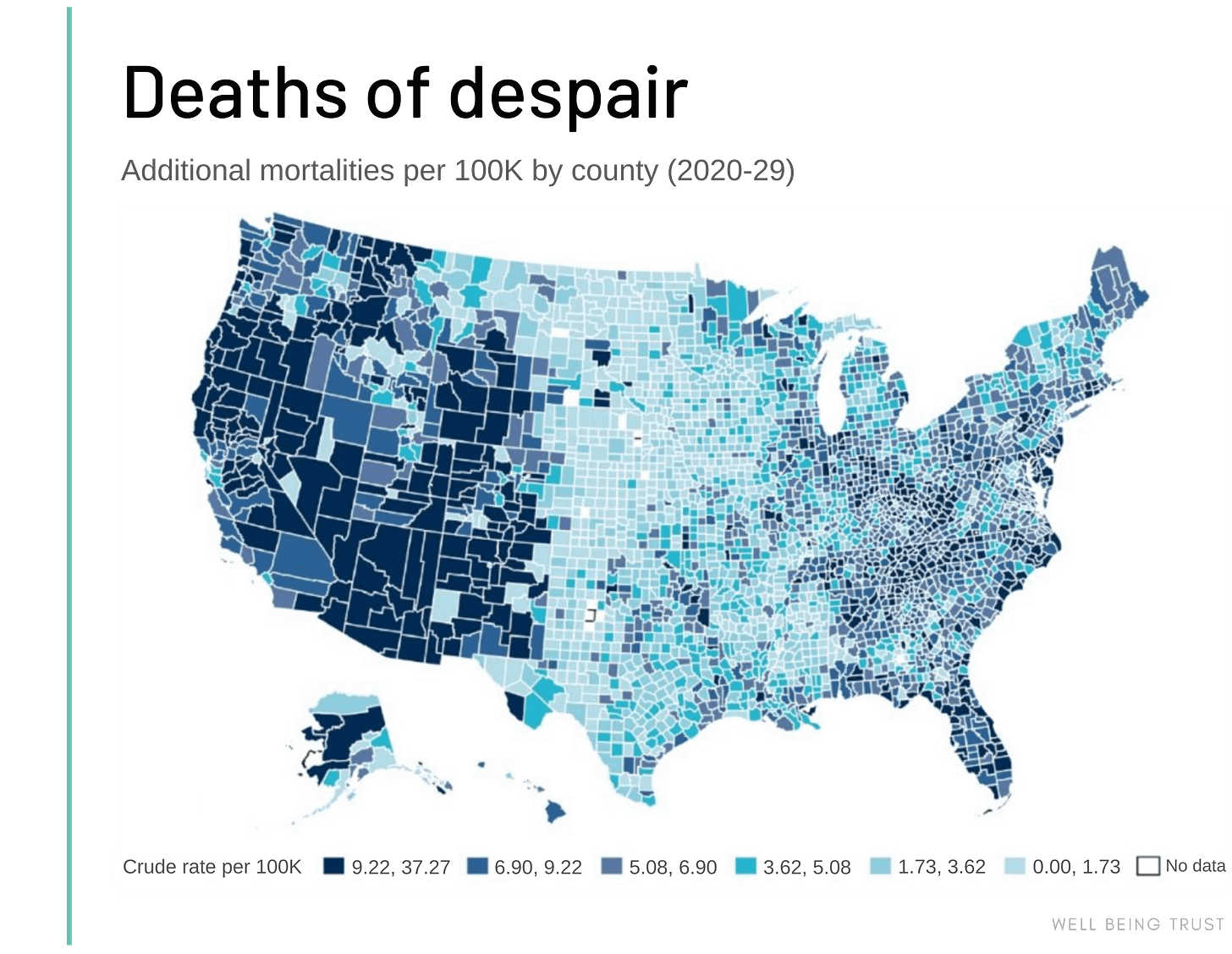
As the Irish proverb goes, "The man takes a drink, the drink takes a drink, the drink takes the man." For many, the coronavirus is creating a perfect storm for substance abuse. The combination of lost employment, social isolation, disrupted care, and universal uncertainty all contribute to an increase in alcohol and drug misuse, which some estimate may result in tens of thousands of added deaths.
A new study from the Well Being Trust analyzes the effect of unemployment on mortality rates to project the number of additional "deaths of despair." According to the research group, as many as 154K may die over the next 9 years because of the coronavirus' effect on addiction, with the likeliest scenario resulting in 75K dead. As shown in the map, highest rates of death per 100K can be found along the west coast, and in southwestern states.
Healthcare startups may be able to mitigate some of the damage. Boulder Care, an opioid addiction treatment company, has seen a 130% week-over-week increase in patient inquiries. Monument and Tempest offer remote care for those with alcohol use disorder. As Monument's founder noted, "people are in the fights of their lives."
Signal
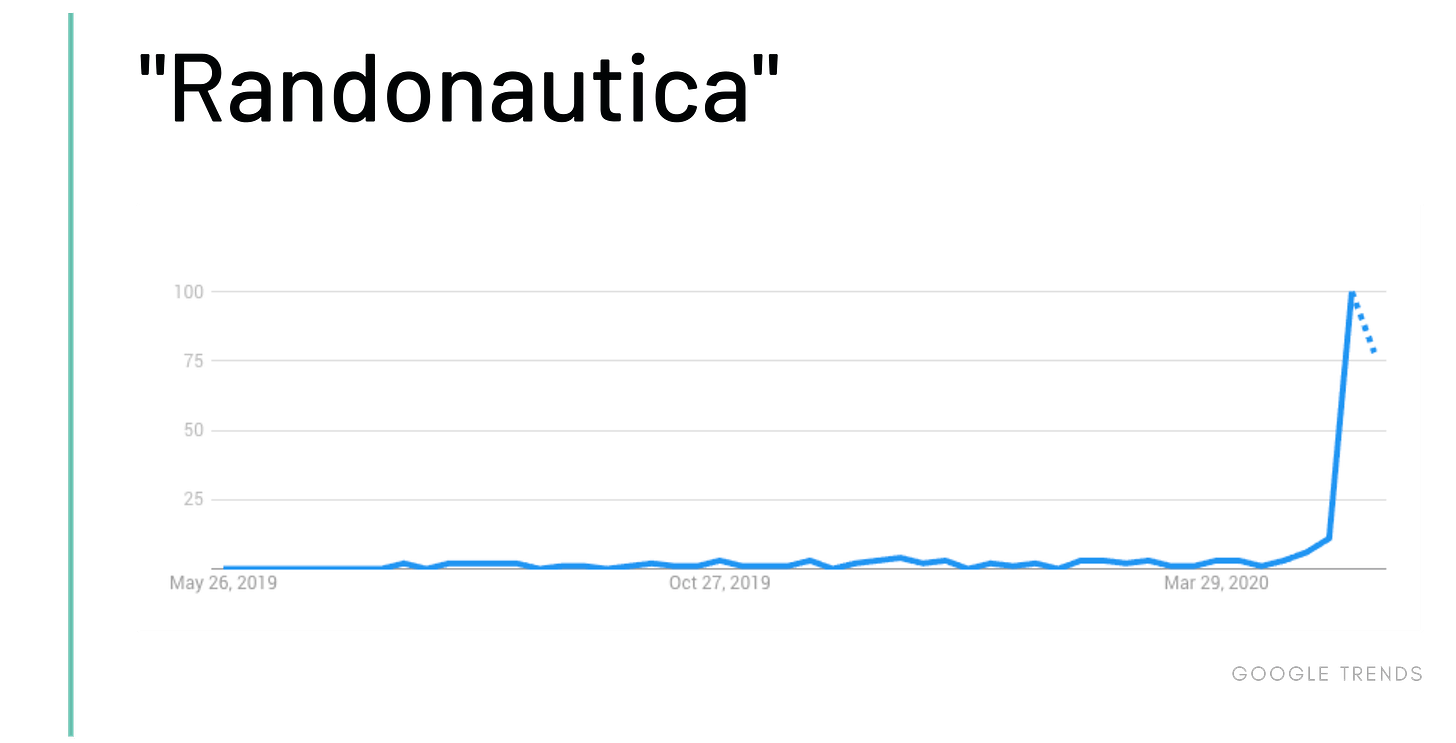
"We are aware that the beta version is resulting in a white screen for many users...there has been an influx of users which is causing a heavy load and crashing our servers."
Seemingly overnight, Randonautica, an app for "randonauts" has surged in popularity. Founded just over a year ago, the randonaut community is bonded by an interest in unusual patterns or "synchronicities" discoved via short walks. Inside the Randonautica app a "quantum random number generator" produces a nearby coordinate which randonauts are instructed to visit. The belief is that at that particular spot some synchronicity may occur, potentially one that aligns with the "intention" set by the wanderer in question.
With many bored in lockdown, randonauting is suddenly en vogue as the adventurous spice up their outdoor forays by framing them as expeditions. The community's Reddit group has spiked to 41K users, while the TikTok tag #randonauting has risen to reach 6.5MM views. Along the way, randonauts have stumbled across mild startling discoveries. One user that set a "sad" intention came across an abandoned home, littered with nooses. Another, seeking direction in their life, confronted a mirror. The words, "IT IS YOUR TIME" were written across it.
Long tail
The Bilzerian blitzkrieg fizzles
For those that might have missed it, hard-partying social media persona Dan Bilzerian is CEO of a publicly-traded company. Ignite International Brands, a peddler of various consumer packaged goods including CBD gummies, alkaline vodka, and dog treats, trades under the BILZ ticker and is valued at $52MM on the Canadian Securities Exchange. But while the bearded lothario's outsized personality has propelled the company to its current status, the cost of Bilzerian's bacchanalian lifestyle, often billed to Ignite as a marketing expense, poses a threat to the company. An interesting look at the financial commingling that occurs in a true influencer business.
TikTok collab houses are staying active despite the lockdown. More here
Karen, a mythical creature of meme lore, has become the heel of the coronavirus. More here
Christopher Nolan's newest feature film, Tenet, debuted inside of Fortnite. More here

"Distance eating"
"It's not going to be as romantic as it has been," said Larry Lynch of the National Restaurant Association. Post-lockdown, diners may have to come to terms with a rather muted restaurant experience. Among the changes considered: plexiglass dividers between tables, disposable plates, streamlined menus, price increases, and lighter service. All very reasonable given the circumstances.
The cancellation of Dreamforce spells disaster for SoMa bars and restaurants. Worse, with the shift to networking online, mega-conferences may be a thing of the past. More here
Even established chains like Chuck E. Cheese and Boston Market are getting in on the "virtual restaurant" game. The former has listed "Pasqually's Pizza" as a brand on Grubhub, forgoing the child-centric (and deeply terrifying) identity for which they're best known. More here
Twitter bots
Up to 60% of Twitter accounts discussing Covid may be bots. While bot involvement usually hovers around 10-20% per Carnegie Mellon's Center for Informed Democracy, a spate of automated posters were created in February and have since been spreading misinformation. This includes some truly mind-numbing suggestions. Amongst suggested cures: eating raw garlic, avoiding ice cream, and snorting cocaine. Would be quite a weekend.
Shock, horror: Facebook's new video streaming service may attempt to harvest your data. More here
Can you troll for good? CartoonsHateHer causes mischief across the internet for laughs. More here
When neo-Nazis coopted video game Crusader Kings, the franchise's creator made sequels more diverse, showing intermarriages between different racial groups. More here
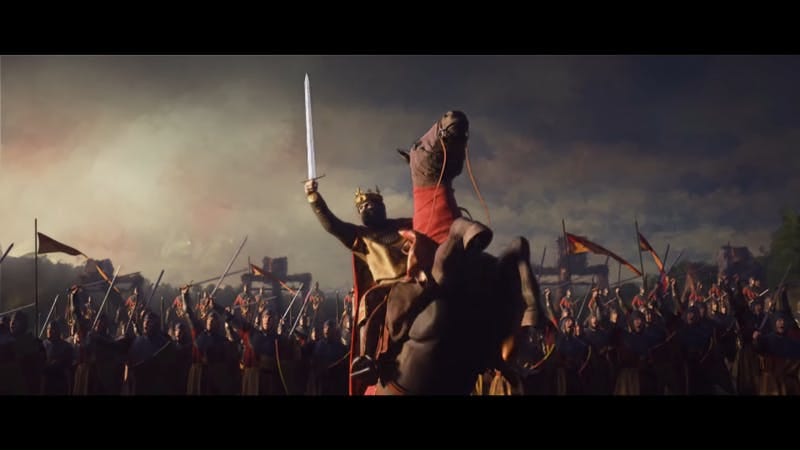
"The Big One"
Though often conceived of as a "once-in-a-100-years" sort of event, an even more devastating pandemic could follow this one. If a new virus had more in common with 1918's influenza, both in terms of effect and scope, more than 400MM might die. Healthcare innovations will not compensate for imbricated supply chains, increased population density, and frequent global travel. Significant investment and planning is needed to avoid "the Big One" from overshadowing our current nightmare.
The coronavirus has forced decarceration with San Francisco's jail population dropping by close to 40%. Some reforms to the prison system may be enduring. More here
Speaking of supply chains, Amazon's Prime Air is expected to 5x over the next 7-8 years, reaching 200 planes. The age of corporation-as-nation is in full swing. More here
Detour
The crypto world was fizzing with drama this week as rumors circulated that Bitcoin's pseudonymous creator, Satoshi Nakamoto, sold some of his stake in the currency. Twitter account @whalealert noticed that coins mined in the first month of Bitcoin's existence had been transferred, sending BTC sliding 4% on Wednesday. While there's no way of knowing whether the move was made by Nakamoto himself (hundreds were already mining the currency at that point), it brought to mind another cryptic creation whose authors are unknown.
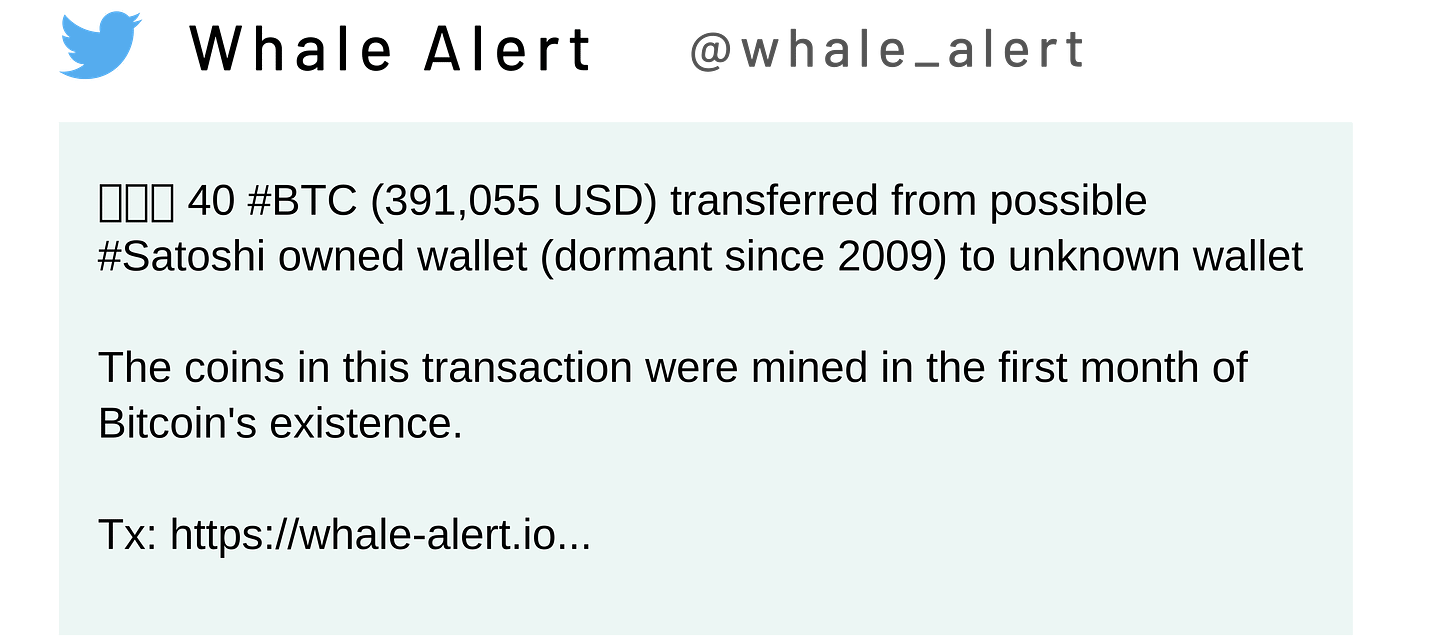
The Voynich manuscript is named after bibliophile Wilfrid Voynich, who brought it into the popular consciousness in the early 1900s. The illustrated, handwritten codex is believed to have created in 15th-century Italy. Beyond that, the text itself, a strange semi-Latin script, has never been deciphered despite the efforts of cryptographers and codebreakers from both World War I and World War II.

The book is said to be divided into seven sections, believed to respectively cover botany, astronomy, cosmology, the zodiac, biology, pharmacology, and different recipes. Illustrations of plants and human bodies fill the pages, with some speculating the manuscript to be a wellness manual for "well to do women in society."
Whatever is contained within its pages, speculation abounds about the authorship of the work. One of the manuscript's first owners, a 17th-century Czech alchemist, believed Roger Bacon, father of empiricism, was the creator. Others believed Da Vinci was behind the work. Others still have argued it was the product of an autistic monk obsessed with a mathematical algorithm.
Like Satoshi, we may never know who created Voynich. As an early owner of the book wrote to a friend, "such Sphinxes as these obey no one but their master."
Jobs
VC Intern - Create - NYC - Apply here
VC Ops - Redesign Health - NYC - Apply here
Chief of Staff - Cedar - NYC - Apply here
Chief of Staff - Mystery VC - NYC - Apply here
VC Associate - TransLink - SF - Apply here
Strategic Partnerships - Asana - SF - Apply here
Principal - Gates Foundation - Seattle - Apply here
VC Analyst - Wave Financial - LA - Apply here
VC Intern - Impression - Remote - Apply here
VC Intern - Acceleprise - Remote - Apply here
Puzzler
If 4 + 2 = 26, 8 + 1 = 79, and 6 + 5 = 111. Then, what is 7 + 3?
A mathematical clue for those so mentally inclined. As always, all guesses welcome and clues given to those curious enough to message.
There's lots of credit to go around this week, with a record six winners jostling for space atop the podium. MWF was first to provide the answer, followed in quick succession by Nick T, Abhinav S, Arnold G, Sam P, and Jimmy S. An impressively snappy response from all of them. Last week's riddle below, for reference.
What has a head, no legs, a tail, and is brown in color?
The right answer? A penny, of course. Congratulations to the record-breakers.
Thank you for reading. If you've been enjoying The Generalist, consider sending today's edition to your friend most likely to go randonauting. Wishing American readers a languorous long weekend and a very happy Memorial Day, and my best to everyone.



